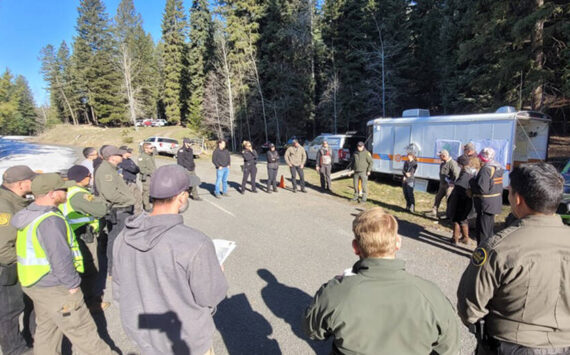TONASKET – The council engaged in a lengthy discussion on how to handle bills for properties that had water leaks that technically are the payer’s responsibility but may have extenuating circumstances involved. A water leak that occurs on the “house” side of the water meter is the homeowner’s (or renter’s) responsibility, while those on the “street” side are the city’s.
However a number of recent leaks, including one that resulted in a bill of $4,255.80 and two others exceeding $500, have the city working to formulate a set policy to deal with those charges.
The council mulled several ideas, including a possible forgiveness of those charges, but didn’t reach a final decision.
“My first concern is negligence,” said council member Scott Olson. “Are we comfortable that they weren’t?”
The problem, city works manager Hugh Jensen pointed out, is that the customer may not know they have a leak either until they receive a water bill, or unless the city notices the leak. With the new digital meters being installed that should make it easier for leaks to come to light more quickly, but Jensen said that even a small leak can release a lot of water with 60 pounds per inch of force behind it.
Olson questioned whether or not the $4,255 bill, for example, truly represented the loss to the city if it’s not paid.
“We’re running a business; it’s not a service. You may certainly have the right to write things off if you have a policy for it. When the hospital board of commissioners write things off it is considered a bad debt. They have to approve each one separately. It should never be a staff member’s call to write off public money. It needs to be the elected officials to write things off individually at a specific time.”
“Yes,” Olson said, “but I would like staff to tell me a person was non-negligent.”
Complicating matters was one case where a tenant, whose name was on the bill, informed the landlord of a leak; the landlord subsequently didn’t get the leak repaired in a timely manner, sticking the tenant with the large bill.
“That’s important information that we need for each one of these,” Plumb said. “Because we are asking to gift public funds every time we are doing this. There needs to be a darned good process in place before that gets done.”
“I think some people don’t know what they have available to them (in terms of emergency service) if they need it,” said council member Jill Vugteveen. “… I lived in the city a long time and wasn’t always educated to that fact.”
The city doesn’t have an emergency number for water leaks; a 911 call for a water leak, would result in the city crew being called out to fix an emergency leak.
“That would be a good thing to have on our water bills,” Olson said. “So people know what to do.”
Plumb, on Olson’s recommendation, said that the city would “pause” on dealing with the three outstanding leak-related bills until a policy could be developed.
“We need to come up with a firm policy that is legal to provide clarity for all customers on the system, that protects both the city and the customer’s interests.”
No decisions were made during the meeting – a future recommendation will have to be voted on by the council – but possibilities included a one-time “forgiveness” of a large leak-related bill, a parial forgiveness, or a pro-rated payment plan.
“It needs to be very delineated why we would (forgive any debt),” Olson said.
Parry’s Acres
The council authorized Varela and Associates to move forward Community Development Block Grant funds for needed improvements to the Parry’s Acres area out of town that is on the city sewer system.
The City of Tonasket took the operation of the neighborhood’s sewer system from Okanogan County decades ago. Now the aged system’s deterioration requires the city’s attention.
“We did ask the county to help us out with this,” Plumb said. “If they did … we would have a better chance of getting it awarded if the county signed on with it.”
“What was the agreement (with the county) when we took the responsibility on?” asked council member Jill Vugteveen, wondering aloud if the city could give the responsibility for repairs back to the county.
“We (the city) signed for permanent ownership,” Plumb said. “They did give us… 50 grand at the time.”
Plumb said that the city took over the sewer system when the county felt it could no longer operate it. The other options apparently were worse, he said.
“Apparently they were going to have to join the city or they were going to get kicked out of their houses,” Plumb said. “They are in a flood plain; they can’t have septic. It was a Catch-22 where the city didn’t want people kicked out of their homes.
“The administration at the time felt it was their duty to do that.”
The situation has been complicated by the fact that residents outside of the city should have been paying a surcharge for the additional service, but the amount they had been paying wasn’t enough to keep the “satellite” system up. Now, their rates have increased as well, leading to a flurry of complaints.
“Most of the people living there today weren’t those owners (30 years ago),” Vugteveen said. “They probably didn’t even know about the problem they were inheriting.”
Pool talk
Karen Stangland, representing the Tonasket Swimming Pool community group, approached the council to discuss methods of accounting for the cost of maintaining the proposed swimming pool.
Those costs are estimated to be in the $40,000 per year range based on a short-season outdoor pool (an indoor pool, which many have expressed a desire for, could cost in excess of $300,000 per year to operate).
Stangland asked if approaching the county commissioners about a county-wide taxing district that could help fund the pool maintenance as well as other recreational needs around the county would work.
“If it were just me, I would rather stick to the Tonasket School District area and let the others fall in line,” Plumb said. “I don’t think the commissioners right now would be real hot on something like that.”
Stangland wondered if Tonasket taxpayers would support such a district.
“This is a very conservative overall county that is very distrustful of tax,” Plumb said. “Even in town, we couldn’t pass one tenth of one percent increase for criminal justice.”
“If it’s Tonasket, people will know if they vote for this, it will be for the pool. If it is county-wide, some people will be wondering what they are getting for it and where the money will go. I would be in favor for more local control.”
“It’s something we haven’t looked at,” Vugteveen said. “If we run out of options I think it’s something to look at again. I applaud your efforts and those of the people in the committee to find a way to make this work… We would be at the commissioners if we did it that way. It might be a viable idea but I’m not sure this is the best time for it.”
Cop costs
Plumb, along with Police Chief Rob Burks, submitted a plan to the council that would help reduce costs in the police department that the council has been trying to rein in.
Plumb proposed that the plan go into effect on May 1, but the council wanted more time to study the proposal.
“State law is very clear the police departments of five officers and above are one classification and departments of four and below are another,” Plumb said. “Police departments can be considered not to have overtime if they work 60 hours a week or less. It’s a specific statute.
“Also we’ve come to an agreement that the on-call is not set up the way it was intended.”
Plumb said that Chief Rob Burks, along with city attorney Mick Howe, proposed doing a one-time base rate increase of $4,000 per officer while eliminating on-call pay, as well as not paying overtime until an officer has surpassed 240 hours in a month.
“(In the last two years), one year we paid $21,000 in on call; the other year was $17,000,” Burks said. “Overtime was $9,000 one year and $12,000 another.”
That would involve a $16,000 annual increase for the department, offset by the subtraction of all of the on-call pay (an average of $18,500 the last two years), as well as the portion of overtime pay that would be converted to regular time pay.
“This seems like short notice for something starting in May,” Olson said. “I would like to see the numbers on paper and have some time to digest it.”
He also expressed concern that the plan would slow down response time with on-call eliminated.
“You can’t expect us to make this kind of decision with you just throwing these numbers out,” Vugteveen said. “Last meeting you were dragging your feet about whether things in this were even legal. So we want to be just as cautious as you.”
“If the budget is going to be out of balance, it’s going to be out because of (the rest of the year),” Olson said. “Waiting four weeks isn’t going to excuse (the rest). I would like another month. If we’re out of budget, it’s not going to be because of that four weeks but because of the other 48 weeks of the year.”
Alternative school presentation
Tonasket Alternative School teacher Chelsea Freeman and a number of her students were on hand to make a presentation about the purpose and effectiveness of the alternative school setting.
The school district has been making an effort to educate the public on the purpose of the alternative school in the wake of some of the feedback regarding February’s failed bond levy that included funding for a new alternative school building.
Students pointed out that they need to meet the same requirements to graduate as do the mainstream high school students, but that the different learning environment and learning methods give them a better opportunity to succeeed.
The alternative school will be holding an open house on May 7 at 5:30 p.m.
Plumb read a resolution officially declaring the city’s support for the alternative school.
“The City of Tonasket resolves to recognized the Tonasket Alternative School’s staff, students and teachers and urges the community to support and learn about the program, and celebrate the success of the program,” it read in part.
Miscellany
- The city accepted the lone bid submitted, $205, to demolish and remove the old storage building at the Tonasket Cemetery.
- The mayor read two additional proclamations. The first honored Amanda McSpadden for her trash clean-up project south of town that Plumb said yielded 17 bags of trash on the stretch between the city limits and the rodeo grounds. The second recognized the North Valley Hospital laboratory staff, which is being honored during National Lab Technician week.
- The city’s engineering firm, Varela and Associates, submitted a list of potential infrastructure projects for the city and asked it to prioritize them.
The council’s next regular meeting is Tuesday, May 13, at 7 p.m.







